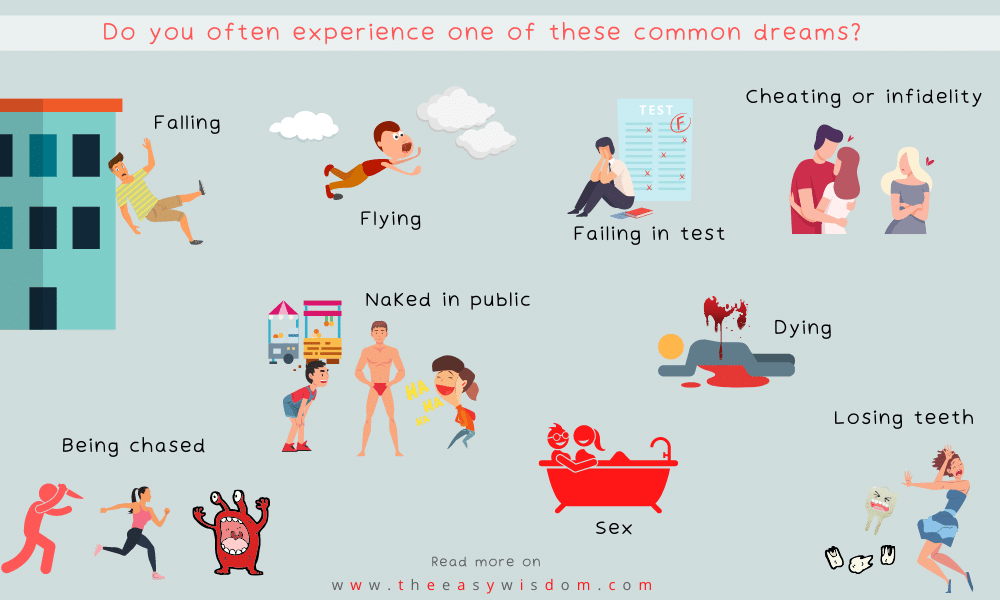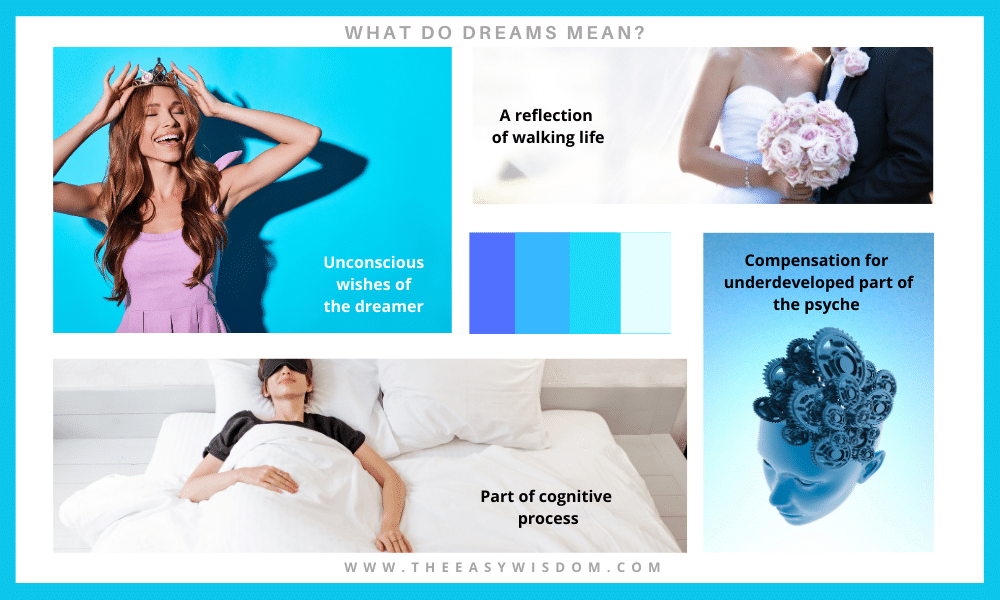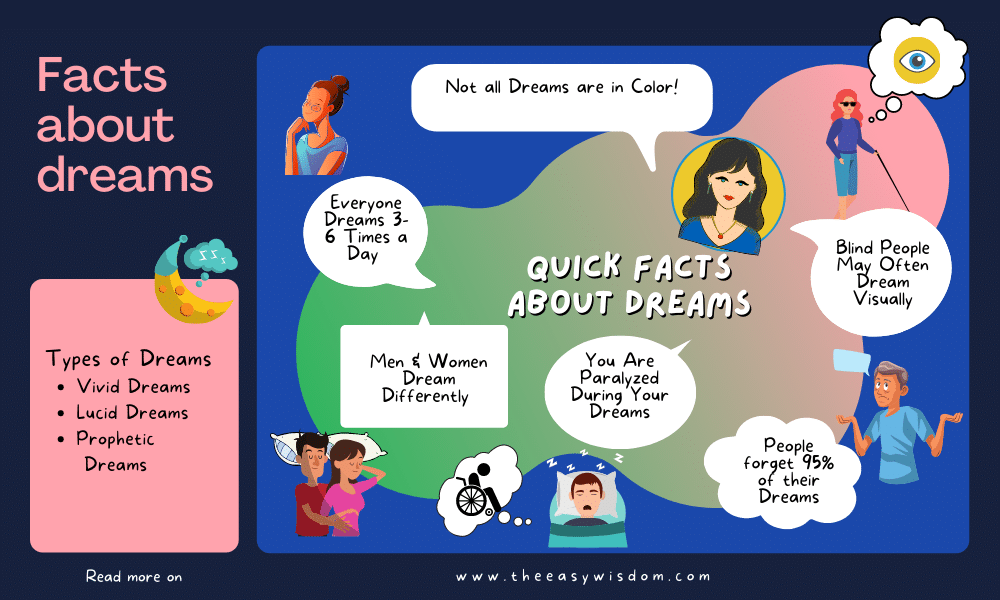In This Article
Are you dreaming a lot lately and pondering ‘are dreams real’? Or are you wondering “why do we get dreams” or “what causes them and what is their meaning? But before we go ahead and unfold: are dreams real, you need to analyze them and answer a few questions like what is the recent dream you can remember? Was anyone you know even in it? Did it occur in a place you know well? Were you doing something familiar? Statistically, most dreams contain fragments of experiences from our waking lives. Therefore, It is quite common to dream about isolated fragments such as a particular person, place, or activity!
Recommended Read: Unleash The Power of Your Subconscious Mind- 8 ways to Translate Dreams into Reality!
A dream is a wish your heart makes
– WALT DISNEY

Sometimes dreams replay complete memories. For instance, the last time you say met your mother, including the place, activities, and people involved? Memories like this are always called episodic because they represent whole episodes instead of just fragments.
Most of our dreams recombine only fragments of waking life. These fragments are relatively familiar; reflect the interests and even concerns of the dreamer! This implies that cyclists dream about cycling, teachers about teaching, and bankers about money. So are dreams real? Well, it depends on how you want to take them!
Are Dreams Real? Why Do We Get Dreams and What They Mean?
Some people believe that dreams are real, while others believe dreams are just part of our imagination and reflections of our daily lives. Scientific explanations believe that we dream when we are stressed, anxious or depressed, and as a result, our subconscious mind results in dreams. These scientists also believe that dreams have an important biological function to serve. For example, dreams enhance our motor skills, prepare our minds for real-life events and challenges, and keep the brain healthy.
However, people in certain traditions or religions believe that dreams have meanings attached to them and need more interpretation.

Why Do We Have Different Kinds of Dreams at Different Times of the Night?
Everyone is well aware of the difference between good dreams and the bad ones called nightmares, but we do not notice that some of them are very logical and structured while others are quite bizarre! Some of them are so realistic that it is strenuous to convince ourselves that they are not real, while others are fuzzy and even indistinct. Some are very fragmented and jump quickly from one topic to another, while others progress into a more coherent story.
Dreams occur in all stages of sleep, but they seem to become increasingly fragmented and splintered as the night progresses. In general, they appear to be constructed out of a mishmash of prior experience. Such fragments can either be pasted together into a semi-random mess or organized in a structured and realistic way.
The dreams that occur in non-REM (Rapid Eye Movement) sleep are shorter yet more cohesive than their REM counterparts and often relate to things that have happened just the day before. REM dreams that occur early in the night reflect recent waking experiences, but they are more scattered than their non-REM counterparts. Conversely, the REM hallucinations that tend to occur late in the night are bizarre plus disjointed!
Although we do not quite understand what causes dreams and how they achieve this type of innovative recombination of material, it seems clear that the sleeping brain is free of constraints and can thus create the whole sequence of free associations! This is not only useful towards creativity; it is also thought to facilitate insight and more so problem-solving. Dreams can be fascinating, exciting, gruesome, or just weird.
As much as 95% of all dreams are forgotten shortly after waking up. According to one theory, they are difficult to remember as the changes in the brain that occur during sleep do not support the information processing and storage that is needed for the memory formation to actually take place.
Brain scans of the sleeping individuals show that the frontal lobes which are the very area that does play a key role in memory formation are quite inactive during the rapid eye movement (REM) sleep, the stage in which dreaming occurs!
– Lupita Nyong’o
No matter where you are from, your dreams are valid.
Facts About Dreams

Here are various facts that give us an important insight into the meaning of dreams and what causes them. So before you conclude ‘are dreams real,’ you should know these facts:
Not All Dreams Are in Colour
While most people report dreaming in only colour, there is a small percentage of people who claim to only have them in black and white. In studies where the dreamers have been awakened or aroused and asked to select colours from a chart that match those in the dreams, it is soft pastel colours that are most frequently chosen!
Men and Women Do Dream Differently
Researchers have found some differences between men and women when it comes to the content of their dreams. In several studies, men have reported dreaming about the weapons significantly more often than women did, while women dream about the references to clothing more often than men have.
Men tend to have a more aggressive content and engaging physical activity, while women’s dreams often contain rejection, debarring, exclusion, and more conversation than physical activity.
Women tend to have slightly longer dreams that feature more characters. When it comes to the characters that typically appear in all the dreams, men tend to dream about other men twice as often as they do about the women, while the women dream about both the sexes equally, as per dream catcher Patrick McNamara.
Negative Emotions Are Quite Common
Various accounts reveal that many emotions are experienced during dreams. The most common emotion experienced is anxiety, and negative emotions, in general, are very common than positive ones!
Blind People May Often Dream Visually
For people who have been blind since birth, researchers have found that they seemed to have experienced visual imagery in their dreams, and they also have eye movements that have correlated quite well to the visual dream recall.
You Are Paralyzed During Your Dreams
REM sleep is characterized by the paralysis of the voluntary muscles. The phenomenon is known as REM atonia and will prevent you from acting out your dreams while you are asleep. Because the motor neurons are not stimulated, your body will not move!
In certain cases, the paralysis carries on right into the waking state for as long as 10 minutes, a condition known as sleep paralysis. While this experience is quite frightening, experts advise that it is perfectly normal and must last only for a few minutes before the normal muscle control returns.
Relieves Anxiety
By decreasing the nightmares, lucid dreaming may even ease nightmare-related anxiety. It is also used to relieve anxiety due to PTSD (Post-Traumatic Stress Disorder). There is anecdotal evidence of lucid dreaming helping ease general anxiety, but further scientific research is definitely required. Some people do say that it allows them to overcome and conquer the very source of their anxiety.
Increases Motor Skills
Dreams increase motor skills. Visualizing the physical movements does increase the actual ability to do them. This can be definitely done during a lucid dream, where the dreamer mentally practices motor skills. When you perform the motor skills while dreaming, your brain’s sensor motor cortex does activate. This is the very part of the brain that does control any form of movement too.
Types of Dreams
Lucid Dreams
Lucid dreams help physical rehabilitation for people with physical disabilities. Typically, more creative people are quite likely to have them. This may be due to their heightened ability towards recalling dreams and visualize events. According to the anecdotal reports, it also works the other way around. People do claim that lucid dreaming increases their creativity and in turn even their imagination.
It is highly possible to interpret a lucid dream, just like you would act with a normal one. Such interpretation can guide you to understand the relevance or the meaning of dreams. People claim dream interpretation is easier during a lucid dream. Your awareness increases your very ability to observe the dream as it happens.
Lucid dreams are also quite vivid and help in remembering the events and details. To interpret them, you should maintain a dream journal. Writing down your dreams will help you in discovering the significant themes! Also, keep a regular journal for recording daily life activities. By making a record of your dreams and daily life, you will be very likely to find enough connections between the two.
Prophetic Dreams
These are the ones that have foretold a future event. If you dream of something happening and then it occurs later, you may have had a prophetic dream.
Historically, dreams were often considered to impart wisdom or even predict the future. In some cultures, dreams are considered to be an ideal way of receiving messages from the spirit world. There is no real way to tell if it is prophetic or not as it comes down to what you finally believe in. Some believe and value that the prophetic dream is just your subconscious mind; anticipating a particular outcome and having you dream it in order to prepare for the same!
Vivid Dreams
These are often associated with waking up during REM sleep when your dreams are the most vivid and more easily remembered. It is used to describe particularly an intense dream that feels very real. You may also remember your vivid dream a lot easier than your typical dream.
Anyone can have vivid dreams, but if you are pregnant or particularly stressed, it may contribute to having one.
Dream Themes
Why do we dream then and are dreams real? We may not have the definitive answers, but there are several types of dream themes and different factors that cause them to occur.
Some of the common themes are often about:
• Falling
• Being chased
• Dying
• Teeth
• Being naked in public
• Pregnancy
• Flying
• Sex or cheating
So if you are contemplating “why I am dreaming so much all of a sudden and are dreams real” and there is a common theme like being chased or making out or cheating, it has a deep psychological connection and there is no definitive answer to it.
Also Read: Is Sexual Distancing Driving You Nuts? Learn How To Deal With Being Horny!
Quick Facts About Dreams
- We may not always remember about dreaming, but everyone dreams between say 3 to 6 times per night
- It is often thought that each dream lasts between 5 to 20 minutes.
- Around 95 percent of dreams are already forgotten by the time a person gets out of bed.
- Dreaming can definitely help you learn and even develop long-term memories.
- Blind people often dream more about the other sensory components compared to the sighted people.
So figure out for yourself are dreams real or not! As is it subjective, magical, and whimsical?
The surest way to make your dreams come true is to live them.
DISCLAIMER: This article ‘are dreams real,’ contains affiliate links and ads from Google, which means that if you click on one of the ads, we will receive a small commission. This helps support the website and allows us to continue to dole out articles like this. Thank you for the support! Thank you for reading!




